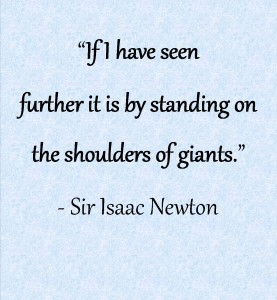 Sir Isaac Newton (January 4, 1643 – March 31, 1727) was an English physicist, mathematician, astronomer, alchemist, inventor, theologian, and philosopher. Newton is often regarded as the most influential scientist in history and is probably most famous for discovering the Laws of Gravity. He was also very humble and gave a great deal of credit to others for who he had become during his life. He said that if he had accomplished anything during his lifetime it was because he had learned from those who had gone before him. There are several lessons to be learned from the above statement. We are who we are today because of the influencers that have shaped our lives — parents, grandparents, guardians, relatives, teachers, coaches, pastors, rabbis, business owners and executives, mentors, authors, association and chamber staff and executives. You get the picture. All are examples of people who have shaped and will continue to shape our lives and our careers.
Sir Isaac Newton (January 4, 1643 – March 31, 1727) was an English physicist, mathematician, astronomer, alchemist, inventor, theologian, and philosopher. Newton is often regarded as the most influential scientist in history and is probably most famous for discovering the Laws of Gravity. He was also very humble and gave a great deal of credit to others for who he had become during his life. He said that if he had accomplished anything during his lifetime it was because he had learned from those who had gone before him. There are several lessons to be learned from the above statement. We are who we are today because of the influencers that have shaped our lives — parents, grandparents, guardians, relatives, teachers, coaches, pastors, rabbis, business owners and executives, mentors, authors, association and chamber staff and executives. You get the picture. All are examples of people who have shaped and will continue to shape our lives and our careers.
Another lesson to be gleaned from that quote is that of humility. While we must have a healthy dose of self-confidence to get ahead, the most effective leaders that I have known each had a great sense of humility. They understood that their accomplishments were in large part due to the efforts of others. Paul “Bear” Bryant, the highly successful and legendary football coach at Union College, Vanderbilt, the University of Georgia, the University of North Carolina, the University of Maryland, the University of Kentucky, Texas A & M University, and the University of Alabama was unmatched in his era in equipping and motivating his players for success.
For a quarter of a century as the head football coach at Alabama, Bryant worked his “Crimson Tide” players hard and expected their best efforts during practice, the weight room, the classroom, and on game day. Bryant remarked, “If anything goes bad, I did it. If anything goes semi-good, we did it. If anything goes really good, then you did it. That’s all it takes to get people to win football games for you.” Bryant said that when they won, it was because of each player’s preparation and effort. When they lost, he said it was his fault, his responsibility. Give credit to others and take responsibility for any shortcomings your team may experience. You will gain the respect and admiration of your staff, your volunteer leadership, your membership, and your peers.
My influencers were, and still are, numerous and come from diverse backgrounds. My first and most important influencers were my mother and father. Growing up, we didn’t have much money, but what I received was so much more valuable. I was given a loving, supportive family, with strong Judeo-Christian values. My father rotated shift work for 34 years at E. I. DuPont de Nemours and Company in Camden, South Carolina, and worked a second job wiring homes as a residential electrician. He gave me the gift of loyalty and a solid work ethic. In October of 2013, my mother celebrated her 60th year as the organist / pianist at Morningside Presbyterian Church in Camden. She gave me the gift of music, loyalty, and perseverance. Both parents provided me with my moral compass and a solid footing.
Research suggests that each of us will influence a minimum of 10,000 people during the course of our lives. Whether that influence is seen as positive or negative is completely up to us. How will your influence on others be felt? Make your influence on others be experienced as positive, motivational, and inspiring. May others say that they saw a little further and accomplished a little more because they were able to stand on your shoulders.